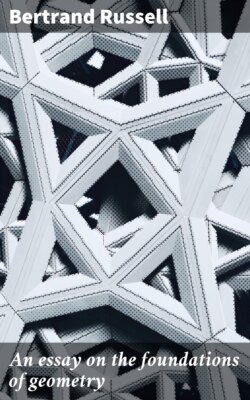An essay on the foundations of geometry

Реклама. ООО «ЛитРес», ИНН: 7719571260.
Оглавление
Bertrand Russell. An essay on the foundations of geometry
An essay on the foundations of geometry
Table of Contents
INTRODUCTION. OUR PROBLEM DEFINED BY ITS RELATIONS TO LOGIC, PSYCHOLOGY AND MATHEMATICS
FOOTNOTES:
CHAPTER I. A SHORT HISTORY OF METAGEOMETRY
First Period
Second Period
Third Period
FOOTNOTES:
CHAPTER II. CRITICAL ACCOUNT OF SOME PREVIOUS PHILOSOPHICAL THEORIES OF GEOMETRY
Kant
Riemann
Helmholtz
Erdmann
Lotze
Delbœuf
FOOTNOTES:
CHAPTER III
Section A. THE AXIOMS OF PROJECTIVE GEOMETRY
Section B. THE AXIOMS OF METRICAL GEOMETRY
I. The Axiom of Free Mobility
II. The Axiom of Dimensions[163]
III. The Axiom of Distance
FOOTNOTES:
CHAPTER IV. PHILOSOPHICAL CONSEQUENCES
Conclusion
FOOTNOTES:
Отрывок из книги
Bertrand Russell
Published by Good Press, 2019
.....
In the third period, which begins with Cayley, the philosophical motive, which had moved the first pioneers, is less apparent, and is replaced by a more technical and mathematical spirit. This period is chiefly distinguished from the second, in a mathematical point of view, by its method, which is projective instead of metrical. The leading mathematical conception here is the Absolute (Grundgebild), a figure by relation to which all metrical properties become projective. Cayley's work, which was very brief, and attracted little attention, has been perfected and elaborated by F. Klein, and through him has found general acceptance. Klein has added to the two kinds of non-Euclidean Geometry already known, a third, which he calls elliptic; this third kind closely resembles Helmholtz's spherical Geometry, but is distinguished by the important difference that, in it, two straight lines meet in only one point[7]. The distinctive mark of the spaces represented by both is that, like the surface of a sphere, they are finite but unbounded. The reduction of metrical to projective properties, as will be proved hereafter, has only a technical importance; at the same time, projective Geometry is able to deal directly with those purely descriptive or qualitative properties of space which are common to Euclid and Metageometry alike. The third period has, therefore, great philosophical importance, while its method has, mathematically, much greater beauty and unity than that of the second; it is able to treat all kinds of space at once, so that every symbolic proposition is, according to the meaning given to the symbols, a proposition in whichever Geometry we choose. This has the advantage of proving that further research cannot lead to contradictions in non-Euclidean systems, unless it at the same moment reveals contradictions in Euclid. These systems, therefore, are logically as sound as that of Euclid himself.
After this brief sketch of the characteristics of the three periods, I will proceed to a more detailed account. It will be my aim to avoid, as far as possible, all technical mathematics, and bring into relief only those fundamental points in the mathematical development, which seem of logical or philosophical importance.
.....